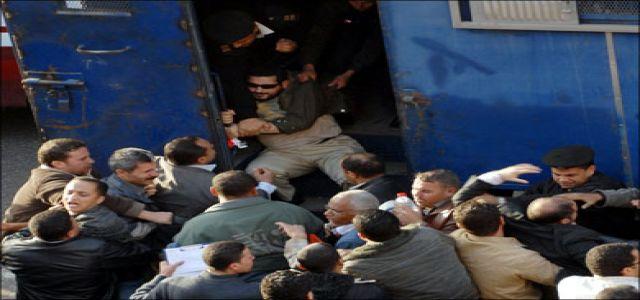- Human RightsPrisoners of Conscience
- February 9, 2010
- 4 minutes read
Egypt arrests top Muslim Brotherhood leaders

CAIRO: It has become all too common for Egypt’s powerful Muslim Brotherhood. Pre-dawn raids have been documented for years by the group’s media, but until Monday morning, the top leaders have been largely left alone. That all changed when the group’s top deputy, Mahmoud Ezzat, Guidance Bureau and spokesman Essam al-Erian and Guidance Bureau Abdul Rahman al-Bir were arrested by Egyptian security forces in yet another pre-dawn raid on their homes on Monday.
The Egyptian ministry of interior said the men were arrested for alleged “illegal activities.” Although officially banned since 1954 – after the government accused the group of attempting to assassinate late President Gamal Abdel Nasser in Alexandria – the Islamic group has had a rennaiscance of some sort in recent years, after garnering nearly one-fifth of Parliamentary seats in the 2005 elections. The MPs are technically independents, but are open about their affiliation with the Brotherhood.
The group espouses a combination of Islamic law with democracy and has become one of the leading voices of pro-democratic reform in the country. Although many analysts argue the group demands a strict Islamic state, Brotherhood officials, especially the younger generation of reform-minded bloggers, have said they prefer a more Turkish-styled democracy.
“The Muslim Brotherhood advocates an Islamic state in Egypt, implementing Islamic law, however, in moderation by becoming a party and promoting Islamic values in a democratic system,” the group told Bikya Masr in a written statement Tuesday.
The group blamed its support of Gaza for the latest crackdown. They said in a statement posted on its official website that their “constant support to the resistance of the besieged people of Gaza and to undermine participation by the group ahead of legislative elections later this year” is the main reason for the leaders’ arrests.
Amnesty International on Monday called on Egyptian authorities “to stop their crackdown on peaceful political dissent and uphold the rights to freedoms of expression, association and assembly.”
In an interview last year after Erian was barred from traveling outside the country, he told Bikya Masr that all leading members of the Muslim Brotherhood “do not fear being jailed,” saying this is “part of the duties we have as members of the group.”
In recent months, the Brotherhood had been making headlines after reports of a possible schism within the movement was rapidly approaching, but leading members told Bikya Masr “this is simply not true.”
Former Supreme Guide Mehdi Akef said that “we have internal discussions and just because we disagree does not mean we are going to break up.”
The Brotherhood has been largely criticized by rights groups in the country for its alleged party platform that forbids Christians and women from becoming president, but leading reformist member Abdel Moneim Aboul Fotouh, who was jailed for four months last year, said weeks before his arrest, that the group was still discussing the platform.
“No decision has been made and we believe in the opportunity of all people, all Egyptians, to become president,” he said at the time. “We have simply said that no woman or Coptic Christian could become President at this time because Egyptians wouldn’t vote for them. It is still to be determined the final draft of our platform.”



